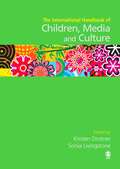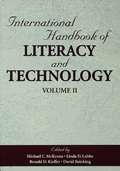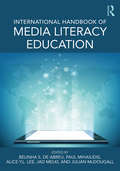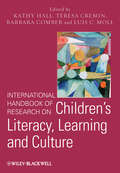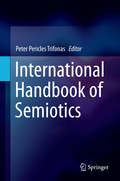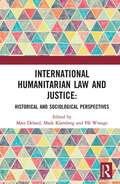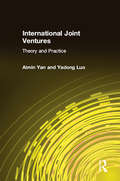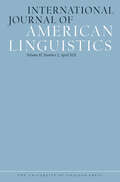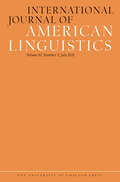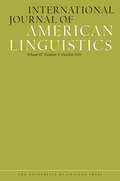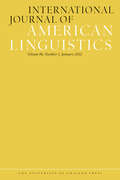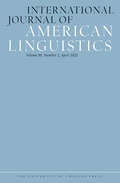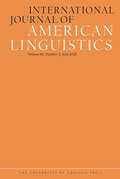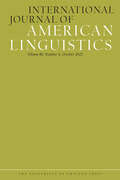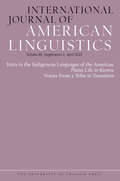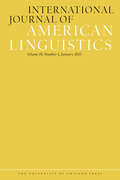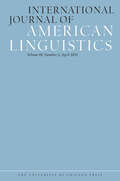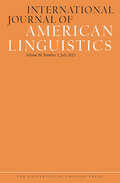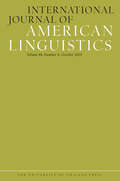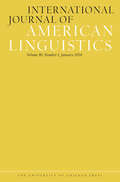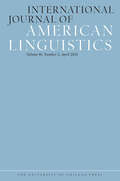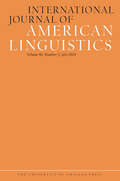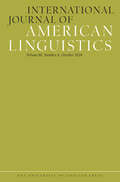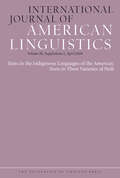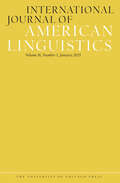- Table View
- List View
International Handbook of Children, Media and Culture (International Handbook Of Quantitative Applications In The Social Sciences Ser.)
by Sonia Livingstone Kirsten DrotnerThis essential volume brings together the work of internationally-renowned researchers, each experts in their field, in order to capture the diversity of children and young people's media cultures around the world. Why are the media such a crucial part of children's daily lives? Are they becoming more important, more influential, and in what ways? Or does a historical perspective reveal how past media have long framed children's cultural horizons or, perhaps, how families - however constituted - have long shaped the ways children relate to media? In addressing such questions, the contributors present detailed empirical cases to uncover how children weave together diverse forms and technologies to create a rich symbolic tapestry which, in turn, shapes their social relationships. At the same time, many concerns - even public panics - arise regarding children's engagement with media, leading the contributors also to inquire into the risky or problematic aspects of today's highly mediated world. Deliberately selected to represent as many parts of the globe as possible, and with a commitment to recognizing both the similarities and differences in children and young people's lives - from China to Denmark, from Canada to India, from Japan to Iceland, from - the authors offer a rich contextualization of children's engagement with their particular media and communication environment, while also pursuing cross-cutting themes in terms of comparative and global trends. Each chapter provides a clear orientation for new readers to the main debates and core issues addressed, combined with a depth of analysis and argumentation to stimulate the thinking of advanced students and established scholars. Since children and young people are a focus of study across different disciplines, the volume is thoroughly multi-disciplinary. Yet since children and young people are all too easily neglected by these same disciplines, this volume hopes to accord their interests and concerns they surely merit.
International Handbook of Literacy and Technology: Volume II
by Michael C. McKenna Linda D. Labbo Ronald D. Kieffer David ReinkingThis Handbook provides a comprehensive and international representation of state-of-the art research, theory, and practice related to principal areas in which significant developments are occurring in the study of literacy and technology. It offers a glimpse of the commonalities faced by literacy educators around the world, together with specific challenges raised by unique circumstances.Volume I of this Handbook endeavored to lay essential groundwork for the study of literacy and technology; it retains an explanatory value that will not weaken over time. Volume II differs considerably in conception. It assumes for the most part a higher level of expertise on the part of readers, and the projects and applications described by the contributors are characterized by greater sophistication. The scope of technology use is broader, and the challenges that have emerged are in sharper focus. A powerful feature of this volume is the addition of commentaries from experts across the field on the potential of technology in key dimensions of literacy. The title of Volume II has changed slightly to reflect the inclusion of contributions on a broad geographic basis. It is now a truly international Handbook, with chapter authors from six countries and five continents.The International Handbook of Literacy and Technology: Volume II is organized in five sections:*The Role of Technology in the New Literacies;*Technology Applications with Specific Populations;*Literacy Software and the Internet;*Teacher Education and Professional Development; and*The Potential of Technology in Key Dimensions of Literacy.The effects of technology on literate activity have been both sweeping and subtle, marked by an increasing variety of changes that are difficult to evaluate and project. Perhaps the only prediction that can be offered with certainty is that the impact of technology is irreversible. Specific changes may come and go, but literacy and technology seem inextricably linked. This Handbook is dedicated to that linkage and to examining the intricacies that define it.International Handbook of Literacy and Technology: Volume II is an essential reference for researchers, professionals, and students in reading/literacy education, literacy and technology, educational technology, and related areas, and will serve well as a text for upper-level and graduate courses on these topics.
International Handbook of Media Literacy Education
by Paul Mihailidis Belinha S. De Abreu Julian McDougall Alice Y.L. Lee Jad MelkiAt the forefront in its field, this Handbook examines the theoretical, conceptual, pedagogical and methodological development of media literacy education and research around the world. Building on traditional media literacy frameworks in critical analysis, evaluation, and assessment, it incorporates new literacies emerging around connective technologies, mobile platforms, and social networks. A global perspective rather than a Western-centric point of view is explicitly highlighted, with contributors from all continents, to show the empirical research being done at the intersection of media, education, and engagement in daily life. Structured around five themes—Educational Interventions; Safeguarding/Data and Online Privacy; Engagement in Civic Life; Media, Creativity and Production; Digital Media Literacy—the volume as a whole emphasizes the competencies needed to engage in meaningful participation in digital culture.
International Handbook of Research on Children's Literacy, Learning and Culture
by Luis C. Moll Barbara Comber Teresa Cremin Kathy HallThe International Handbook of Research in Children's Literacy, Learning and Culture presents an authoritative distillation of current global knowledge related to the field of primary years literacy studies.Features chapters that conceptualize, interpret, and synthesize relevant researchCritically reviews past and current research in order to influence future directions in the field of literacyOffers literacy scholars an international perspective that recognizes and anticipates increasing diversity in literacy practices and cultures
International Handbook of Semiotics
by Peter Pericles TrifonasThis book provides an extensive overview and analysis of current work on semiotics that is being pursued globally in the areas of literature, the visual arts, cultural studies, media, the humanities, natural sciences and social sciences. Semiotics--also known as structuralism--is one of the major theoretical movements of the 20th century and its influence as a way to conduct analyses of cultural products and human practices has been immense. This is a comprehensive volume that brings together many otherwise fragmented academic disciplines and currents, uniting them in the framework of semiotics. Addressing a longstanding need, it provides a global perspective on recent and ongoing semiotic research across a broad range of disciplines. The handbook is intended for all researchers interested in applying semiotics as a critical lens for inquiry across diverse disciplines.
International Humanitarian Law and Justice: Historical and Sociological Perspectives
by Mats Deland Mark Klamberg Pål WrangeIn the last decade, there has been a turn to history in international humanitarian law and its accompanying fields. To examine this historization and to expand the current scope of scholarship, this book brings together scholars from various fields, including law, history, sociology, and international relations. Human rights law, international criminal law, and the law on the use of force are all explored across the text’s four main themes: historiographies of selected fields of international law; evolution of specific international humanitarian law rules in the context of legal gaps and fault lines; emotions as a factor in international law; and how actors can influence history. This work will enhance and broaden readers’ knowledge of the field and serve as an excellent starting point for further research.
International Joint Ventures: Theory and Practice
by Yadong Luo Aimin YanThe first book-length treatment of theories, practical lessons, and the full set of critical issues that affect international joint ventures. It addresses culture, human resources, learning, legal, management, and research and development, and presents a full set of decisions and detailed guidelines for IJV formation and management. It also thoroughly analyzes 30 case studies.
International Journal of American Linguistics, volume 87 number 2 (April 2021)
by International Journal of American LinguisticsThis is volume 87 issue 2 of International Journal of American Linguistics. The International Journal of American Linguistics (IJAL) is dedicated to the documentation and analysis of the indigenous languages of the Americas. Founded by Franz Boas and Pliny Earle Goddard in 1917, the journal focuses on the linguistics of American Indigenous languages. IJAL is an important repository for research based on field work and archival materials on the languages of North and South America.
International Journal of American Linguistics, volume 87 number 3 (July 2021)
by International Journal of American LinguisticsThis is volume 87 issue 3 of International Journal of American Linguistics. The International Journal of American Linguistics (IJAL) is dedicated to the documentation and analysis of the indigenous languages of the Americas. Founded by Franz Boas and Pliny Earle Goddard in 1917, the journal focuses on the linguistics of American Indigenous languages. IJAL is an important repository for research based on field work and archival materials on the languages of North and South America.
International Journal of American Linguistics, volume 87 number 4 (October 2021)
by International Journal of American LinguisticsThis is volume 87 issue 4 of International Journal of American Linguistics. The International Journal of American Linguistics (IJAL) is dedicated to the documentation and analysis of the indigenous languages of the Americas. Founded by Franz Boas and Pliny Earle Goddard in 1917, the journal focuses on the linguistics of American Indigenous languages. IJAL is an important repository for research based on field work and archival materials on the languages of North and South America.
International Journal of American Linguistics, volume 88 number 1 (January 2022)
by International Journal of American LinguisticsThis is volume 88 issue 1 of International Journal of American Linguistics. The International Journal of American Linguistics (IJAL) is dedicated to the documentation and analysis of the indigenous languages of the Americas. Founded by Franz Boas and Pliny Earle Goddard in 1917, the journal focuses on the linguistics of American Indigenous languages. IJAL is an important repository for research based on field work and archival materials on the languages of North and South America.
International Journal of American Linguistics, volume 88 number 2 (April 2022)
by International Journal of American LinguisticsThis is volume 88 issue 2 of International Journal of American Linguistics. The International Journal of American Linguistics (IJAL) is dedicated to the documentation and analysis of the indigenous languages of the Americas. Founded by Franz Boas and Pliny Earle Goddard in 1917, the journal focuses on the linguistics of American Indigenous languages. IJAL is an important repository for research based on field work and archival materials on the languages of North and South America.
International Journal of American Linguistics, volume 88 number 3 (July 2022)
by International Journal of American LinguisticsThis is volume 88 issue 3 of International Journal of American Linguistics. The International Journal of American Linguistics (IJAL) is dedicated to the documentation and analysis of the indigenous languages of the Americas. Founded by Franz Boas and Pliny Earle Goddard in 1917, the journal focuses on the linguistics of American Indigenous languages. IJAL is an important repository for research based on field work and archival materials on the languages of North and South America.
International Journal of American Linguistics, volume 88 number 4 (October 2022)
by International Journal of American LinguisticsThis is volume 88 issue 4 of International Journal of American Linguistics. The International Journal of American Linguistics (IJAL) is dedicated to the documentation and analysis of the indigenous languages of the Americas. Founded by Franz Boas and Pliny Earle Goddard in 1917, the journal focuses on the linguistics of American Indigenous languages. IJAL is an important repository for research based on field work and archival materials on the languages of North and South America.
International Journal of American Linguistics, volume 88 number S1 (April 2022)
by International Journal of American LinguisticsThis is volume 88 issue S1 of International Journal of American Linguistics. The International Journal of American Linguistics (IJAL) is dedicated to the documentation and analysis of the indigenous languages of the Americas. Founded by Franz Boas and Pliny Earle Goddard in 1917, the journal focuses on the linguistics of American Indigenous languages. IJAL is an important repository for research based on field work and archival materials on the languages of North and South America.
International Journal of American Linguistics, volume 89 number 1 (January 2023)
by International Journal of American LinguisticsThis is volume 89 issue 1 of International Journal of American Linguistics. The International Journal of American Linguistics (IJAL) is dedicated to the documentation and analysis of the indigenous languages of the Americas. Founded by Franz Boas and Pliny Earle Goddard in 1917, the journal focuses on the linguistics of American Indigenous languages. IJAL is an important repository for research based on field work and archival materials on the languages of North and South America.
International Journal of American Linguistics, volume 89 number 2 (April 2023)
by International Journal of American LinguisticsThis is volume 89 issue 2 of International Journal of American Linguistics. The International Journal of American Linguistics (IJAL) is dedicated to the documentation and analysis of the indigenous languages of the Americas. Founded by Franz Boas and Pliny Earle Goddard in 1917, the journal focuses on the linguistics of American Indigenous languages. IJAL is an important repository for research based on field work and archival materials on the languages of North and South America.
International Journal of American Linguistics, volume 89 number 3 (July 2023)
by International Journal of American LinguisticsThis is volume 89 issue 3 of International Journal of American Linguistics. The International Journal of American Linguistics (IJAL) is dedicated to the documentation and analysis of the indigenous languages of the Americas. Founded by Franz Boas and Pliny Earle Goddard in 1917, the journal focuses on the linguistics of American Indigenous languages. IJAL is an important repository for research based on field work and archival materials on the languages of North and South America.
International Journal of American Linguistics, volume 89 number 4 (October 2023)
by International Journal of American LinguisticsThis is volume 89 issue 4 of International Journal of American Linguistics. The International Journal of American Linguistics (IJAL) is dedicated to the documentation and analysis of the indigenous languages of the Americas. Founded by Franz Boas and Pliny Earle Goddard in 1917, the journal focuses on the linguistics of American Indigenous languages. IJAL is an important repository for research based on field work and archival materials on the languages of North and South America.
International Journal of American Linguistics, volume 90 number 1 (January 2024)
by International Journal of American LinguisticsThis is volume 90 issue 1 of International Journal of American Linguistics. The International Journal of American Linguistics (IJAL) is dedicated to the documentation and analysis of the indigenous languages of the Americas. Founded by Franz Boas and Pliny Earle Goddard in 1917, the journal focuses on the linguistics of American Indigenous languages. IJAL is an important repository for research based on field work and archival materials on the languages of North and South America.
International Journal of American Linguistics, volume 90 number 2 (April 2024)
by International Journal of American LinguisticsThis is volume 90 issue 2 of International Journal of American Linguistics. The International Journal of American Linguistics (IJAL) is dedicated to the documentation and analysis of the indigenous languages of the Americas. Founded by Franz Boas and Pliny Earle Goddard in 1917, the journal focuses on the linguistics of American Indigenous languages. IJAL is an important repository for research based on field work and archival materials on the languages of North and South America.
International Journal of American Linguistics, volume 90 number 3 (July 2024)
by International Journal of American LinguisticsThis is volume 90 issue 3 of International Journal of American Linguistics. The International Journal of American Linguistics (IJAL) is dedicated to the documentation and analysis of the indigenous languages of the Americas. Founded by Franz Boas and Pliny Earle Goddard in 1917, the journal focuses on the linguistics of American Indigenous languages. IJAL is an important repository for research based on field work and archival materials on the languages of North and South America.
International Journal of American Linguistics, volume 90 number 4 (October 2024)
by International Journal of American LinguisticsThis is volume 90 issue 4 of International Journal of American Linguistics. The International Journal of American Linguistics (IJAL) is dedicated to the documentation and analysis of the indigenous languages of the Americas. Founded by Franz Boas and Pliny Earle Goddard in 1917, the journal focuses on the linguistics of American Indigenous languages. IJAL is an important repository for research based on field work and archival materials on the languages of North and South America.
International Journal of American Linguistics, volume 90 number S1 (April 2024)
by International Journal of American LinguisticsThis is volume 90 issue S1 of International Journal of American Linguistics. The International Journal of American Linguistics (IJAL) is dedicated to the documentation and analysis of the indigenous languages of the Americas. Founded by Franz Boas and Pliny Earle Goddard in 1917, the journal focuses on the linguistics of American Indigenous languages. IJAL is an important repository for research based on field work and archival materials on the languages of North and South America.
International Journal of American Linguistics, volume 91 number 1 (January 2025)
by International Journal of American LinguisticsThis is volume 91 issue 1 of International Journal of American Linguistics. The International Journal of American Linguistics (IJAL) is dedicated to the documentation and analysis of the indigenous languages of the Americas. Founded by Franz Boas and Pliny Earle Goddard in 1917, the journal focuses on the linguistics of American Indigenous languages. IJAL is an important repository for research based on field work and archival materials on the languages of North and South America.
